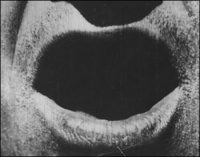George Lakoff
From The Art and Popular Culture Encyclopedia
|
"There exists no Kantian radically autonomous person, with absolute freedom and a transcendent reason that correctly dictates what is and isn't moral. Reason, arising from the body, doesn't transcend the body [...] There is no poststructuralist person--no completely decentered subject for whom all meaning is arbitrary, totally relative, and purely historically contingent, unconstrained by body and brain" --Philosophy in the Flesh: The Embodied Mind and Its Challenge to Western Thought (1999) George Lakoff, Mark Johnson |

Illustration: a close-up of a mouth in the film The Big Swallow (1901)
|
Related e |
|
Featured: |
George P. Lakoff (born May 24, 1941) is a professor of cognitive linguistics at the University of California, Berkeley, where he has taught since 1972. Although some of his research involves questions traditionally pursued by linguists, such as the conditions under which a certain linguistic construction is grammatically viable, he is most famous for his ideas about the centrality of metaphor to human thinking, political behavior and society. He is particularly famous for his concept of the "embodied mind," which he has written about in relation to mathematics. In recent years he has applied his work to the realm of politics, exploring this in his books. He is the founder of the progressive think tank the Rockridge Institute.
Lakoff's original thesis on conceptual metaphor was expressed in his book with Mark Johnson entitled Metaphors We Live By in 1980.
See also
- Code word (figure of speech)
- Cognitive linguistics
- Cognitive science of mathematics
- Conceptual metaphor
- Embodied philosophy
- Framing (social sciences)
- Invariance principle
- Language and thought
- Metaphor
- Metonymy

